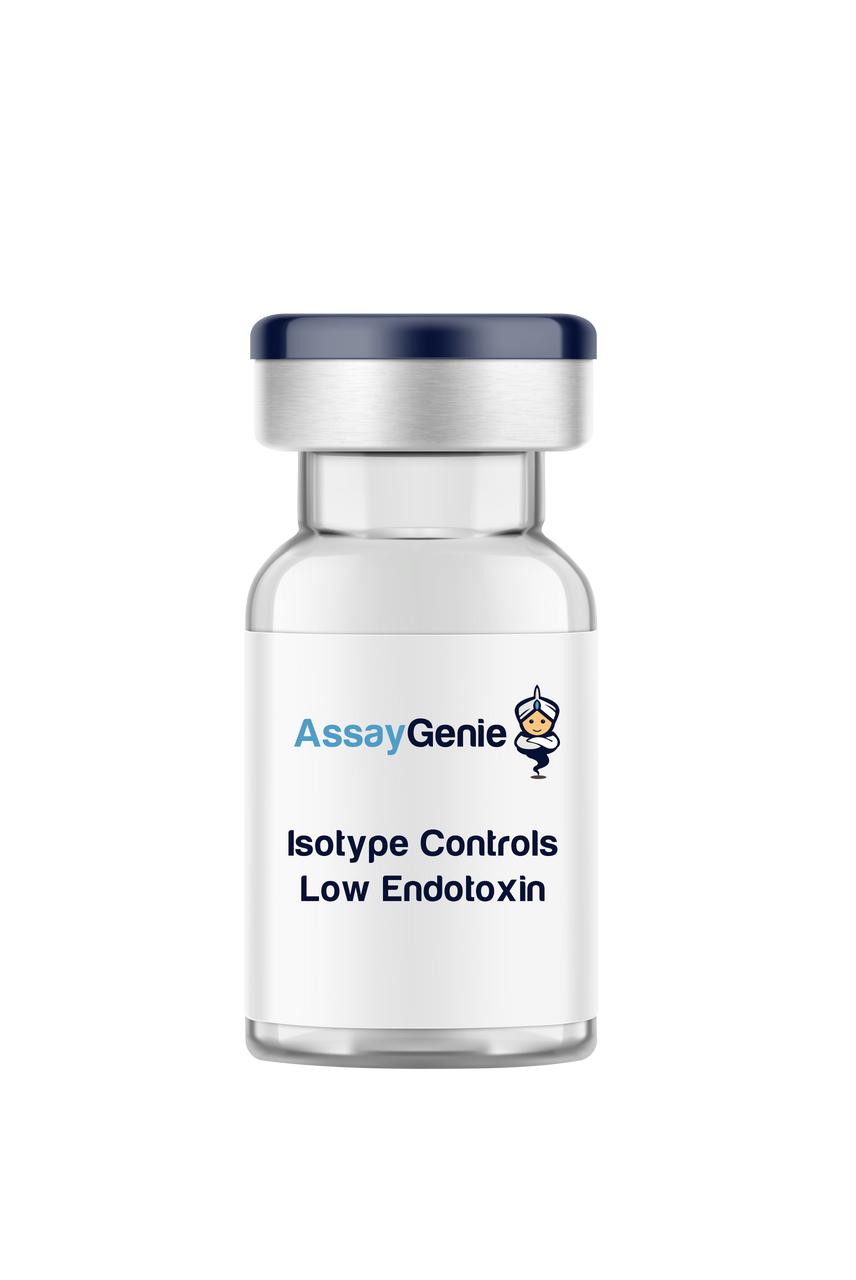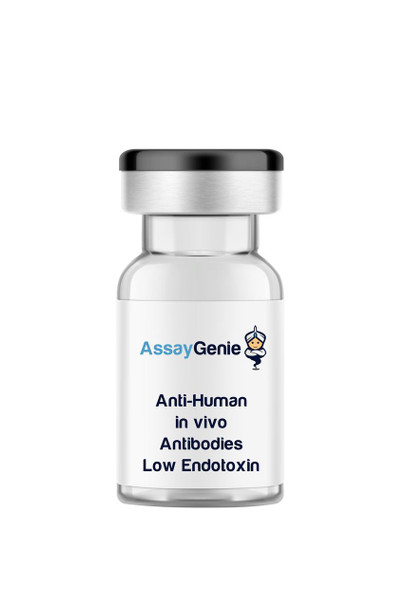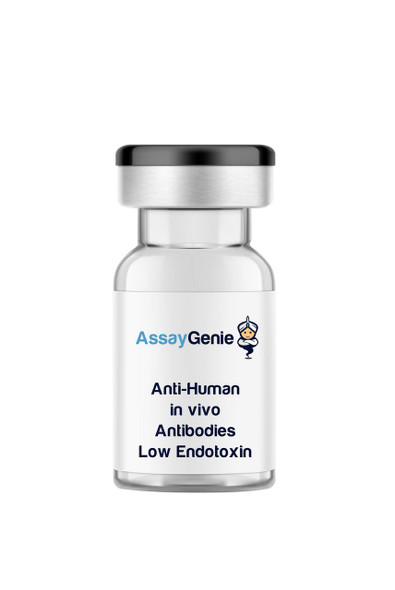Anti-Human CD7 In Vivo Antibody - Low Endotoxin (IVMB0123)
- SKU:
- IVMB0123
- Product Type:
- In Vivo Monoclonal Antibody
- Clone:
- T3-3A1
- Protein:
- CD7
- Isotype:
- Mouse IgG1 kappa
- Reactivity:
- Human
- Endotoxin Level:
- Low Endotoxin
- Host Species:
- Mouse
- Applications:
- FC
- IF Staining
Description
Anti-Human CD7 In Vivo Antibody - Low Endotoxin
Introducing the Anti-Human CD7 In Vivo Antibody - Low Endotoxin from Assay Genie, a highly specific monoclonal antibody designed for in vivo applications. This antibody targets the CD7 protein, a vital component in T-cell interactions and signaling, making it indispensable for research in immunology and related fields. With a rat IgG2b kappa isotype, it ensures high purity and low endotoxin levels (<1.0 EU/mg), suitable for ELISA, flow cytometry, immunohistochemistry, and various other assays.
Available in multiple sizes, it is formulated in phosphate-buffered saline for maximum stability and efficacy. Elevate your research with this reliable and versatile antibody. CD7 is a glycoprotein found on the surface of immature and mature T cells, as well as NK cells. It plays a significant role in T-cell interactions and signal transduction, and is often used as a marker in studies involving T-cell development and function.
| Product Name: | Anti-Human CD7 In Vivo Antibody - Low Endotoxin |
| Product Code: | IVMB0123 |
| Size: | 1mg, 5mg, 25mg, 50mg, 100mg |
| Clone: | T3-3A1 |
| Protein: | CD7 |
| Product Type: | Monoclonal Antibody |
| Isotype: | Mouse IgG1 κ |
| Reactivity: | Human |
| Applications: | FC, IF Staining |
| Formulation: | This monoclonal antibody is aseptically packaged and formulated in 0.01 M phosphate buffered saline (150 mM NaCl) PBS pH 7.2 - 7.4 with no carrier protein, potassium, calcium or preservatives added. |
| Endotoxin Level: | < 1.0 EU/mg as determined by the LAL method |
| Purity: | ≥95% monomer by analytical SEC >95% by SDS Page |
| Preparation: | Functional grade preclinical antibodies are manufactured in an animal free facility using only In vitro protein free cell culture techniques and are purified by a multi-step process including the use of protein A or G to assure extremely low levels of endotoxins, leachable protein A or aggregates. |
| Storage and Handling: | Functional grade preclinical antibodies may be stored sterile as received at 2-8°C for up to one month. For longer term storage, aseptically aliquot in working volumes without diluting and store at -80°C. Avoid Repeated Freeze Thaw Cycles. |
| Applications: | FC, IF Staining |
| Recommended Usage: | FC The suggested concentration for this T3-3A1 antibody for staining cells in flow cytometry is ≤ 0.5 - 1 µg per 106 in a volume of 0.1 ml or 0.1 ml of whole blood. Titration of the reagent is recommended for optimal performance for each application. |
| Reactivity: | Human |
| Host Species: | Mouse |
| Specificity: | Clone T3-3A1 recognizes an epitope on human CD7. |
| Antigen Distribution: | CD7 is expressed on T cells, NK cells, thymocytes, hematopoietic progenitors, some normal B cells, malignant B cells, acute lymphocytic leukemia (ALL) cells, and some acute myeloid leukemia (AML) cells. It is weakly expressed on monocytes. |
| Concentration: | ≥ 2.0 mg/ml |
| Endotoxin Level: | < 1.0 EU/mg as determined by the LAL method |
| Purity: | ≥95% monomer by analytical SEC >95% by SDS Page |
| Formulation: | This monoclonal antibody is aseptically packaged and formulated in 0.01 M phosphate buffered saline (150 mM NaCl) PBS pH 7.2 - 7.4 with no carrier protein, potassium, calcium or preservatives added. |
| Preparation: | Functional grade preclinical antibodies are manufactured in an animal free facility using only In vitro protein free cell culture techniques and are purified by a multi-step process including the use of protein A or G to assure extremely low levels of endotoxins, leachable protein A or aggregates. |
| Storage and Handling: | Functional grade preclinical antibodies may be stored sterile as received at 2-8°C for up to one month. For longer term storage, aseptically aliquot in working volumes without diluting and store at -80°C. Avoid Repeated Freeze Thaw Cycles. |
CD7 is a 40 kD type I transmembrane glycoprotein and is a member of the Ig superfamily. It plays a vital role in T-cell interactions, in adition to, T-cell/B-cell interaction during early lymphoid development, and has been shown to interact with PIK3R1. Functional studies indicate that crosslinking of the CD7 can stimulate transmembrane calcium flux in T cells. Lack of CD7 expression can help to diagnose T-cell lymphoproliferative disorders, such as mycosis fungoides/Sezary syndrome and adult T-cell leukemia/lymphoma.
| Technical Datasheet: | View |
| Protein: | CD7 |
| Ligand/Receptor: | Cytoplasmic domain associates with P13-kinase |
| Research Area: | Costimulatory Molecules, Immunology |

| Mouse IgG1 Isotype Control [HKSP] | |
|---|---|
| Clone | HKSP |
| Isotype | Mouse IgG1 |
| Endotoxin Level | Low Endotoxin |

| Mouse IgG1 Isotype Control [HKSP84] | |
|---|---|
| Clone | HKSP84 |
| Isotype | Mouse IgG1 |
| Endotoxin Level | Low Endotoxin |
Meet the team!
Shane Costigan
Territory Manager & Team Lead
Abdul Khadim
Sales Executive






